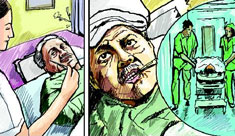25 November 2011
By Pratibha Masand
Spasticity Spells Calamity For Paralytic Patient
The Sharmas from Vashi never imagined that using a mercuric t h e r m o m e t e r could translate into a near–fatal situation till Saturday night, when Pradeep Sharma, who has been paralyzed and bedridden for the past eight months, suddenly had a spasticity attack, clamped his teeth on a thermometer and swallowed all the mercury.

Earlier this year, Pradeep (41) suffered a stroke, which rendered him paralyzed and since then, he has been bedridden. Recently, his family appointed a new nurse to take care of him. Calamity struck on Saturday night, when the nurse decided to check Pradeep's temperature as he has been running a fever. As soon as she placed the thermometer in his mouth, he had a spasticity attack–when the muscles contract involuntary–crushing it inside his mouth and swallowing the mercury. "We were stunned for a few minutes. Nobody knew how to react," said Nitin, Pradeep's younger brother. "By the time we opened his mouth and removed the glass pieces, he had already swallowed the mercury." A thermometer contains about 0.5–0.6 ml of mercury, all of which went into Pradeep's system.
Doctors Attach Tube To Feeding Channel, Suck Out MercuryThough Nitin was rushed to Fortis Hiranandani Hospital in Vashi immediately, doctors detected that the mercury had already reached his stomach. "We conducted an X–ray on him and found that the mercury droplet had broken into several particles," said Dr Jignesh Gandhi, who attended to Pradeep, adding that operation was the only way to remove the mercury particles from his body. Doctors said paralyzed patients often suffered from such involuntary tightening of muscles and it could happen in any part of the body.
Since his paralysis, a feeding tube has been attached to Pradeep's abdomen, through which food was passed from outside through a funnel–like structure. The next day, when the doctors conducted the surgery, they attached another tube to the feeding channel. "Since he suffered a stroke, he lost his ability to eat. So, a feeding channel is attached to his abdomen. We fixed a suction tube to the channel and sucked the mercury out of his body successfully," said Dr Gandhi, gastrointestinal and laparoscopic surgeon at the hospital. The mercury was then carefully disposed of. The doctors were all the more worried as it "was a challenge to put a paralytic patient under anaesthesia". But the operation went off well. "He is now doing fine. The mercury is out of his system and doctors say he can be discharged soon. However, he will take some more time to recuperate from his paralysis," said Nitin.
Poisoning effectMercury poisoning may lead to peripheral neuropathy (itching, burning or eye pain), skin discolouration (pink cheeks, fingertips and toes), swelling and desquamation (shedding of skin)
It may lead to profuse sweating, faster heartbeats, increased salivation and hypertension
It may cause kidney dysfunction or neuropsychiatric symptoms such as emotional instability, memory impairment or insomnia
The toxic fumes of elemental mercury can affect lung functions and even damage digestive organs
Mercuric thermometers have been banned in the UK, Austria, Bulgaria, Denmark, Poland, Spain and Sweden following the implementation of the European Union Ban directive in April 2008. It is not used in the US after the United States Environmental Protection Agency and American Academy of Pediatrics put a stop to it. Even The Philippines' health department has prohibited its use. These countries measure body temperature with digital thermometers, forehead strips and ear thermometers
1 Pradeep Sharma, paralyzed for the past 8 months, has a fever. On Saturday night, a nurse puts a thermometer in his mouth to check his temperature 2 Owing to spasticity (muscle contraction), he clamps his teeth on the thermometer and swallows 0.5 ml mercury 3 Early on Sunday, doctors fix a tube to the feeding channel attached to his abdomen and remove the mercury






